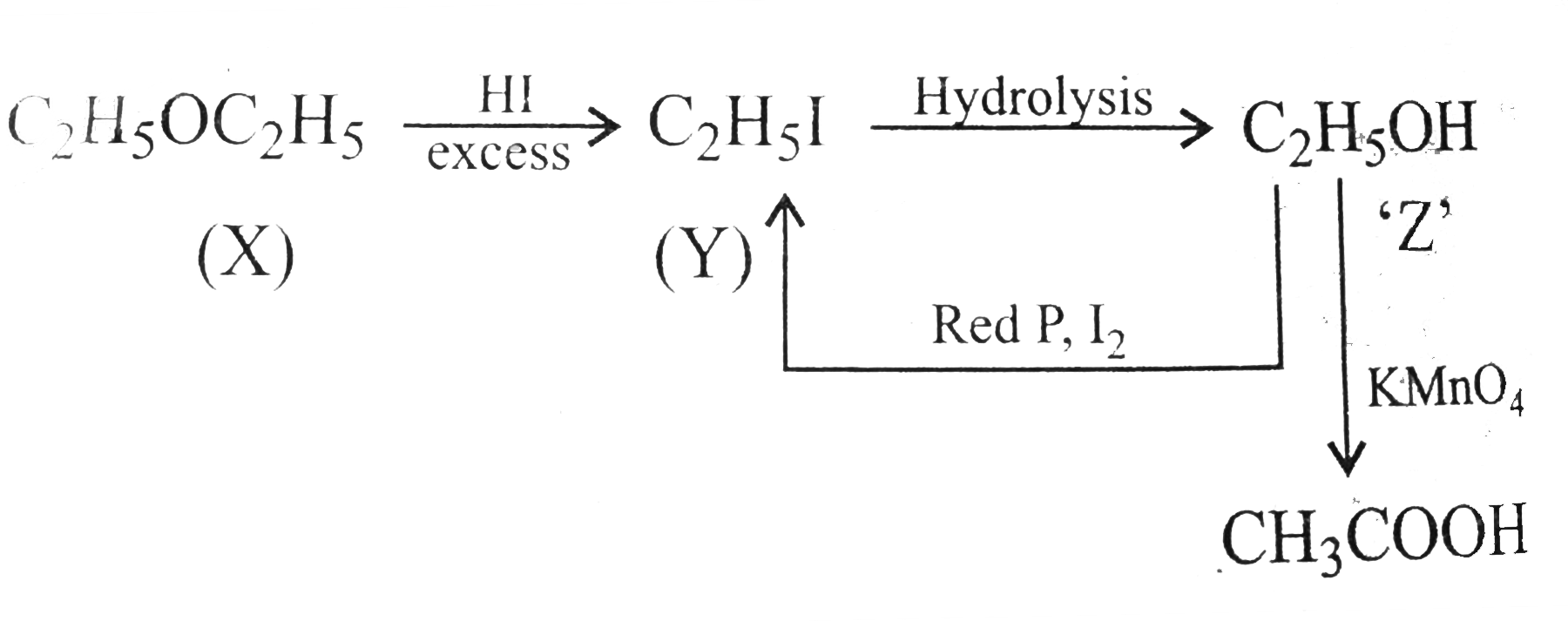A compound (X) containg C,H, and O is unreactive towards sodium. It does not add with bromine. It also and excess of Hl,(X) yields only one organic product (Y),(Y) on hydrolsis yield s a new compond (Z) whch can be converted to (Y) by reaction with red phosphours and permangnate gives a carboxlic acid. The equivalanet weight of this acid is 60. What are the compounds (X), teh conversion of (X) to (Y).
Since compound (X) does not react with sodium, so it is neither an acid nor an alchol [(−OH□) group absent]. Compound (X) does not react with Schiff's reagent so it is not an aldehyde.
Compound (X) yields only one product with excess of HI, so it may be an ether and the last product of given sequence of reactions is an acid with molecular weight 60, so the acid is acetic acid (CH3COOH) and the ether si diethyl ether.
(Becuase acdi is two C compound, so ether contains four carbons).

Topper's Solved these Questions
- AROMATIC COMPOUNDS AND ALKYL AND ARYL HALIDES BOOK - CENGAGE CHEMISTRYCHAPTER - AROMATIC COMPOUNDS AND ALKYL AND ARYL HALIDES EXERCISE - Archives Subjective Type
4 Videos
- APPENDIX INORGANIC VOLUME 2BOOK - CENGAGE CHEMISTRYCHAPTER - APPENDIX INORGANIC VOLUME 2EXERCISE - Short Answer Type
179 Videos
- BIOMOLECULESBOOK - CENGAGE CHEMISTRYCHAPTER - BIOMOLECULESEXERCISE - Exercises Archives (Analytical And Descriptive)
8 Videos
Similar Questions
A compound 'X' containing C, H and O is unreactive towards sodium. It does not add with bromine. It also does not react with Schiff's reagent. On refluxing with an excess of HI, 'X' yields only one oragnic product 'Y'.'Y' on hydrolysis yield a new compound 'Z' which can be converted into 'Y' by reaction with red phosphorus and iodine. the compound 'Z' on oxidation with potassium permanganate gives a carboxylic acid. The equivalent weight of acid is 60. What are the compounds 'X','Y' and 'Z'? Write chemical equations leading to the conversion of 'X' to 'Y'.
View SolutionA compound 'X' containing C, H and O is unreactive towards sodium. It does not add with bromine. It also does not react with Schiff's reagent. On refluxing with an excess of HI, 'X' yields only one oragnic product 'Y'.'Y' on hydrolysis yield a new compound 'Z' which can be converted into 'Y' by reaction with red phosphorus and iodine. the compound 'Z' on oxidation with potassium permanganate gives a carboxylic acid. The equivalent weight of acid is 60. What are the compounds 'X','Y' and 'Z'? Write chemical equations leading to the conversion of 'X' to 'Y'.
View Solution
Knowledge Check
Wurtz reaction of methyl iodide yields an organic compound X. Which one of the following reactions also yields X?
AC2H5Cl+Mgdry ether−−−−→BC2H5Cl+LiAlH4→CC2H5Cl+C5H5ONa→DCHCl3Ag powder−−−−−→ΔWurtz reaction of methyl iodide yields an organic compound X Which one of the following reactions also yields X .
AC2H5CI+Mgdryether−−−−→BC2H5Cl+LiAlH4→CC2H5CI+C2H5ONa→DCHCI3Ag powder−−−−−→ΔWurtz reaction of methyl iodide yields an organic compound X. Which one of the following reactions also yields X?
AC2H5Cl + Mg dryether−−−−→BC2H5 Cl + LiAlH4(→)CC2H5Cl + C2H5Ona→DCHCl3Ag powder−−−−−−−−→Δ
A compound (W) containing only C,H and O is unreactive towards sodium .It does not add bromine . It also does not reacts with Schiff's reagent . On refluxing with excess of hydroiodic acic. (W) yields only one organic product (X). On hydrolysis (X) yields a new compound (Y) which can be converted to (X) by reaction with red phosphorus and iodine . The compound (Y) on oxidation with potassium permanganate gives a carboxylic acid (Z), with a equivalent weight 60. What are (W),(X),(Y) and (Z) ?
View SolutionA compound (X) containing C,H and O is unreactive towards sodium. It does not added up bromine. It does also not react with Schiff's reagent. On refluxing with excess of HI,(X) gives only (Y).(Y) on hydrolysis gives (Z) which can be converted to (Y) by the action of P and I2. Compound (Z) on oxidation gives an acid of equivalent mass 60. What are (X), (Y) and (Z) ?
View SolutionWurtz reaction of methyl iodide yields an organic compound X. Which one of the following reactions also yields X?
View SolutionWurtz reaction of methyl iodide yields an organic compound X. Which one of the following reactions also yields X?
View SolutionWurtz reaction of methyl iodide yields an organic compound X. Which one of the following Reactions also yields X
View Solution
